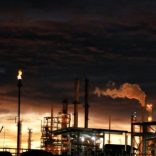TotalEnergies working on Mozambique LNG restart, CEO says
Mozambique must become the leading player in its own LNG exploitation – Interview

Mozambican economist Rui Mate says that Mozambique "should look for an alternative and see how it can make these projects viable and enter the gas production market without depending so much on these other companies; it must be the leading player, the leader of the exploitation. Because, so far, what happens is that Mozambique participates [only] as a partner". [Image: DW]
- What is missing for Mozambique to really be an alternative to Russian gas?
- The European Union has already admitted that Mozambican gas is an alternative to its dependence on Russian gas. Economist Rui Mate says that the country should assume the role of “lead player” in this market and not depend on multinationals.
According to the Empresa Nacional de Hidrocarbonetos (ENH), which is owned by the Mozambican state, to supply gas to Europe would require building a second floating platform for the production of liquefied natural gas (LNG), similar to the one already sitting in the Rovuma Basin.
READ: Mozambique: Second FLNG platform enters the Rovuma gas equation
In an interview with DW Africa, economist Rui Mate argues that, on the one hand, Mozambique has to start showing “some progress” to European investors and, on the other hand, the country needs to stop depending on foreign multinationals operating in the sector – which end up dictating “the rules of the game”.
DW Africa: What is missing for Mozambique to effectively position itself as an alternative to Russian gas?
Rui Mate (RM): Mozambique has to start showing European investors some progress on the part of the state itself – because at the moment all investment is by multinational companies and they are, in a way, dictating the rules of the game. So, there are some steps that Mozambique needs to start taking to see how it can influence this scenario.
READ: Gas from Mozambique is among the alternatives for Europe – EU
Mozambique must, by itself, begin to examine the possibility of creating a state-owned company to do this exploitation. Mozambique should look for an alternative and see how it can make these projects viable and enter the gas production market without depending so much on these other companies; it must be the leading player, the leader of the exploitation. Because, so far, what happens is that Mozambique participates [only] as a partner.
DW Africa: Despite the progress made, we know that terrorism has not yet been eradicated in Cabo Delgado. Will insecurity in the province continue to be an obstacle?
RM: It is true that, for part of the reserves, exploitation will be onshore, not offshore. But we have a project led by ExxonMobil, which is also dependent on stability in the province and which, at the moment, calls into question the exploitation of these resources. If this project goes ahead, it will be a great alternative energy source to what Europe currently gets from Russia.
Although ExxonMobil has said that it will return only with the return of TotalEnergies, its project is not greatly affected by the situation onshore. It will be on the high seas. It is known that this project is one of the largest investments in the area.
DW Africa: Although the country has gas reserves in the order of 180 trillion cubic feet, the gas from the approved projects is already pre-sold. Will Mozambique have the capacity to respond to supply the European market, with production in large volumes?
RM: In the first phase, it would be a challenge, because it took a lot of investment to build this supply capacity. It’s something that wasn’t in the country’s initial plans, but it has to start being put on the table. Mozambique must begin to examine how it can respond to this demand and show new ways of acting within the sector. It must not act only as a country that provides the resources simply because they are located here, but also as a country that can extract these resources and export them directly, on its own.
READ: Mozambique: Country could be gas supplier to Europe replacing Russia – ENH
DW Africa: Mozambique has been neutral in relation to the conflict in Ukraine, but its close historical relationship with Russia is well known. Could that positionin relation to Kyiv harm the country in this regard?
RM: In a way, the commercial and political aspects intersect at some point. As Mozambique is an alternative to Russia’s gas, it may, in fact, pose a threat to Russia – if it does not position itself in favour [of Russia] it may start to generate some conflict. Moscow may begin to force Mozambique to take a stand. After all, which side are you on?
Russia is attentive to all countries that provide alternative supplies of those products in which it is hegemonic. When these countries begin to respond, they will weaken Russia’s position. And Russia does not want to be weakened at this point in time.












Leave a Reply
Be the First to Comment!
You must be logged in to post a comment.
You must be logged in to post a comment.